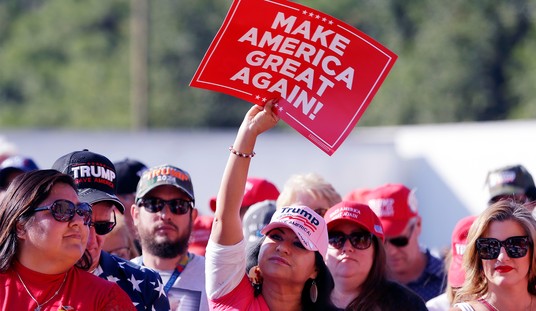In movies, it’s called the “cheer moment” — that wonderfully satisfying part of the motion picture when the bully/bad guy finally gets his richly deserved comeuppance: Rocky flooring Apollo Creed in the first Rocky; John McClane sending Hans Gruber to hell off a high floor of Nakatomi Plaza. And in 2016, nobody’s demise was cheered more vociferously than the mainstream media’s. But don’t take it from me, take it from a tattered remnant of what was once one of the seven pillars of the MSM (along with the New York Times, the Washington Post, NBC, CBS, ABC, and Time magazine), Newsweek.
Riffing off Ross Douthat’s infamous tweet of Sept. 2015 — “The entire commentariat is going to feel a little silly when Marco Rubio wins every Republican primary” — writer Zach Schonfeld notes:
At best, it’s just a dopey prediction—we’ve all made some of those. At worst, it’s an enduring avatar of the cartoonish arrogance and mass-scale humiliation that overtook the pundit class in 2016. It’s a microcosm of the biggest media trend of the year: total humiliation.
It was not just Douthat. For lots of high-profile media personalities, from Nate Silver to Nick Denton, 2016 dealt an enormous reckoning. Michael Moore made some startling predictions, but few other liberal commentators saw what was happening. Much of the pundit industrial complex spent the calendar year standing athwart history, yelling “It can’t happen here” or “Trump is going to pivot any day now.” Clinton lost. Pundits ate crow, took the L—choose your preferred cliché. One columnist ate his newspaper column, as he had promised to do if Trump became the GOP nominee. Some who got it wrong showed a capacity for self-reflection. Others, like Kevin Drum of Mother Jones, doubled down on their myopic pontificating or continued howling into their social media echo chamber of choice.
It was the year we realized that a lot of Very Important People who get paid a lot of money to know about U.S. politics have little more insight to dispense than the cab drivers they quote in their columns… For Trump fans, it is thrillingly apt that the candidate whose rise to power blindsided the media is the same candidate who staked his entire campaign on bald contempt for journalists. Trump’s bone-deep loathing of the “dishonest media” might be his only coherent ideology.
Well, as they say: it’s a start.
With all due modesty, let me here note that I, along with Salena Zito, was one of the few MSM writers who did get it right, as a quick perusal of my Sunday New York Post columns from Dec. 2015 to Oct. 2016 will easily show. Here’s one from April 2016:
The media has consistently underestimated Trump’s genuine appeal to the white working class, which is tired of being the one group in America it’s OK to scorn.
In the last few primaries, Trump outperformed his poll numbers by 6 percent (New York) to 12 percent (Pennsylvania). Which indicates that — surprise — folks sometimes lie to pollsters even as they secretly admire Trump’s freewheeling positions on such hot-button issues as illegal immigration, Islamic terrorism and the Obama administration’s diplomatic ineptitude.
Finally, there’s this: What doesn’t take Trump down only makes him stronger and more popular. Every rival who’s rushed him headlong has been eliminated. Every time he says something that’s the “last straw,” his numbers jump.
In the end, of course, it will come down to turnout. Can Trump pick up enough disaffected Democrats in places like Pennsylvania and Ohio to offset the Democrats’ advantage among minorities and force them to play defense in states they normally take for granted?
Not since the bitter Adams-Jefferson election of 1800 will the nation have seen such a no-holds-barred, down-and-dirty slugfest. But after 16 years of misguided Bush interventionism and pallid Obama apathy, the momentum is on Trump’s side.
My pre-election column from Oct. 30 might also be of interest:
Because here’s the good news for Trump: Despite the structural advantages in the Electoral College the Democrats currently enjoy — they start with New York (29), Illinois (20) and California (55) already in their pockets — the truth is that Trump need only retain the states Romney won in 2012 (including, critically, North Carolina) and then flip these three battleground states: Ohio, Pennsylvania and Florida. That would give him a 273-265 victory.
Bingo. And he surprised even me by winning Wisconsin and Michigan.
The MSM’s problem was not a lack of good political reporters; it was a failure of imagination. Most of the Baby Boomers who still populate the upper ranks of journalism were on their last campaign. They believed — as they had since the days of The Boys on the Bus — that the key to winning a presidential election was ads, ads and more ads, bought by self-enriching krack kadres of kampaign konsultants. The presidency, as they understood it, was a matter of “selling” a candidate and that the candidate who outraised and outspent the others was most likely to succeed.
Oops.
But there’s more bad news for the MSM: The flagship Times just announced it’s selling off eight floors of its still new headquarters in midtown Manhattan. Elsewhere, magazines have folded and surviving newspaper have drastically cut back on space and staff. Here’s Newsweek again:
Humiliation came in other forms in 2016, too. The newspaper and digital media industries continued to flail without a stable business model. Hundreds if not thousands of reporters lost their jobs. Mashable, The Associated Press, The Guardian, The Huffington Post and Fusion all laid off journalists en masse—as did IBT, Newsweek’s parent company. (Getting fired is humiliating enough, but finding out you’ve been fired because your Slack log-in isn’t working is a nifty little bonus. Such is the modern termination.) Al Jazeera America shuttered. The Wall Street Journal pressured its employees to consider taking a buyout. Even the New York Times, which emerged during the final weeks of the campaign as an emblem of aggressive reporting on Trump’s taxes and alleged assaults, was vulnerable to pressure to downsize.
I’d like to tell you that 2017 will be better—that everything will be OK for the media, that news organizations will stop hemorrhaging reporters and resources, that journalism will prevail over fascism. I’d love to tell you that the entire commentariat is going to feel a little silly for fretting over the threatened state of a free press under Trump. But why would you believe me?
When you get right down to it, all the media — from the Times to the humblest local weekly — have going for them is credibility, and when that is shot, so is everything else. In their enthusiam to heft Hillary’s avoirdupois through the glass ceiling, some prominent journalists openly applauded the abandonment of objectivity as a chimera, only to be forced to eat their own words shortly after the election:
The misfire on Tuesday night was about a lot more than a failure in polling. It was a failure to capture the boiling anger of a large portion of the American electorate that feels left behind by a selective recovery, betrayed by trade deals that they see as threats to their jobs and disrespected by establishment Washington, Wall Street and the mainstream media.
Journalists didn’t question the polling data when it confirmed their gut feeling that Mr. Trump could never in a million years pull it off. They portrayed Trump supporters who still believed he had a shot as being out of touch with reality. In the end, it was the other way around. It was just a few months ago that so much of the European media failed to foresee the vote in Britain to leave the European Union. Election 2016, thy name is Brexit.
Politics is not just about numbers; data can’t always capture the human condition that is the blood of American politics. And it is not the sole function of political reporting to tell you who will win or who will lose. But that question — the horse race — has too often shadowed everything else, and inevitably colors other reporting, too.
This is what happens when reporters become blind partisans, and when their grasp of larger cultural issues is subsumed by the horse race. And yet, despite their horrendous failure — why, indeed, should anyone even believe them again when they tout a sure thing like Hillary Clinton? — you can bet that, four years from now, they’ll happily do it all over again.
Those who survive, that is.
Follow me on Twitter @dkahanerules









Join the conversation as a VIP Member